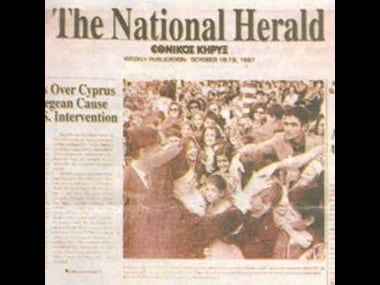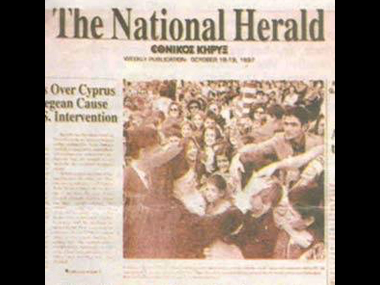The National Herald controversy is set to take many unexpected twists and turns, but it has overshadowed the impact this once-influential and popular paper had on English journalism in India in the 1960s and 1970s. It stood tall over the media horizon despite being known as a partisan paper, and it drew the strength of credibility because of its stalwart editors. [caption id=“attachment_2537504” align=“alignleft” width=“380”]  Image courtesy: IBNlive[/caption] For many young people like me in the 70s wishing to make a career in English journalism, the choice was obvious and limited, at least in North India. The first was the National Herald and the other was The Pioneer. The National Herald was the largest circulated daily in Uttar Pradesh in those decades. Later, even though its publication was interrupted by frequent lock-outs, lay-offs and strikes, its readership and popularity remained as high. The paper epitomized quality in English language, credibility and working conditions. Young graduates tried hard to get a recommendation to join it either in the editorial or marketing departments, but, mostly the recommendations did not help. It was partly because of the lukewarm response the paper’s management gave to the names sent in by the UP Congress Committee (UPCC) and partly because the image of its editors was such that one wouldn’t easily dare to approach them. It was in such an environment that I joined the paper as a trainee journalist on June 1, 1976, a few months after completing my post-graduation from Lucknow University. Interestingly, the recruitment of six trainees (of which I was one) was the first in about a decade when freshers were appointed. Earlier, only those with a little experience in either journalism or English teaching were considered for appointment. Or else, they were old hands appointed directly by the then editor M Chalapathi Rau (popularly known as MC) in Delhi or CN Chitta Ranjan (known as CNC), the resident editor in Lucknow. I was among the lucky ones to have been appointed by MC himself. For the first time the paper had carried a small advertisement inviting applications from graduates to be selected as trainees. The applicant pool — graduates and postgraduates in humanities, science and commerce appeared in a written test and those having cleared it had to face MC for the interview. He asked me just a few questions in his typical rasping voice about how serious I was about this career and then asked me to contact the office later. I still treasure the appointment letter signed by him that I got a few days later. Incidentally, there was one woman among the six persons selected, and at present only two other persons – besides me – continue to be in active journalism. It was the second year of Emergency and National Herald too was not spared by the local censor officers who used to come and sit in the teleprinter room a few times, even though the News Editor asked them to get out and stay out. Working in the National Herald Lucknow office was like a dream come true at that time. Its majestic yellow building with high ceilings and arched passages in the city’s Kaiserbagh area had an old world charm and the inevitable tales about one part being haunted by the spirit of a long-deceased priest. The office attendants were irked by so many youngsters in the office and were patronizing towards all of us, telling us to stay away from seniors’ tables, stacks of papers, old newspaper files and so on. The clickety-clack of the teleprinters and the steady stream of items torn and brought to the desk by an office peon created a magical effect on most of us. The hot-metal technology used at that time meant that the items had to be edited with pen, the headline was written on a separate piece of paper attached with a pin to the item. These were sent to the composing section where veteran operators sat in front of monstrous Linotype machines that had mechanical arms, trays and a trough in the rear that contained molten lead. The operators were like demi-gods, and had to be kept in good humour always. It was no wonder that they were in the forefront of the trade unions at that time. The headlines were composed separately by a set of operators on Monotype/Ludlow machines, and were wrapped in the paper on which they were written. Then the headline and the composed matter – all in shining hot lead – were put together by another set of workers and put in galleys from which galley proof were taken out by a huge roller soaked in black ink. While we avoided coming close to the ink business, it was still a matter of pride and a mark of respect if our clothes were stained with ink — it meant that we were actually in the midst of work. The first taste of something being wrong in the dream world of English journalism came in 1977 when the Janata Party stormed to power and even Indira Gandhi was defeated. Our editors told us that we could be in for trouble. However, nothing much changed till 1979 when the paper suffered its first lock-out. Those were the days when non-professional players started making their presence felt in the office. We used to see politicians, small-time businessmen and middlemen come to the marketing department even though they did not have the courage to enter the newsroom as trade unions staged a noisy sit-in demanding salaries. Often during a stroll outside we saw a car stop at the gate and a few men alight with a huge suitcase. Cash had been delivered for newsprint and part payment of wages, we were told. The period from 1979 to 1983 (when I finally left the paper to join elsewhere) was one of serious turmoil. Seniors left the paper in quick succession but the editors – P. Tharyan, K. Panikkar, Hari Jaisingh, P.C. Tandon – kept the hope alive. On the management side, Managing Director Yashpal Kapoor was the man of the moment with frequent intervention by Executive Director MM Agarwal and Kanpur businessman Vinod Malhotra. Most of the professional managers in marketing and circulation had left the paper by then. National Herald as an organisation fell on such bad ways financially that old loyalists borrowed newsprint and accessories from other printing presses using their goodwill in the market. During this time, the old building was demolished and a huge shopping complex by the name of Nehru Manzil was sought to be constructed (it remains half-constructed even today.) In one part of the land a modern multi-storeyed building was constructed in which many floors were rented out to banks and other organizations. But the expenditure and accumulated dues were way too much than the rent and soon the funding dried up, leading to frequent suspension of publication. All those, including me, who left the paper did so with a heavy heart. Even though many of us did not subscribe to the ideology of the party that controlled it, it was the towering presence of editors that made the paper an integral part of Indian media in those days. Orderly work, checking and cross-checking, impartial reporting and correctness of language were hallmarks of National Herald brand of journalism. The paper is long closed and deals are being exposed. The law may eventually have its way, but the National Herald influence on the media continues through those few from the paper who still serve the industry. Read Ratan Mani Lal’s letter from MC:
Herald RatanThe paper is long closed and deals are being exposed. The law may eventually have its way, but the National Herald influence on the media continues through those few from the paper who still serve the industry.
Advertisement
End of Article


)
)
)
)
)
)
)
)
)



